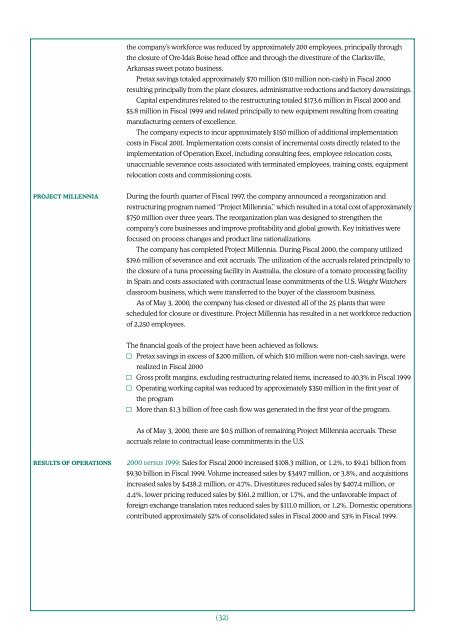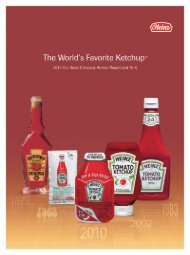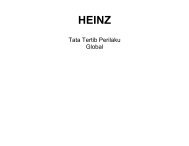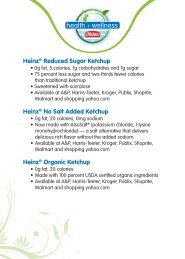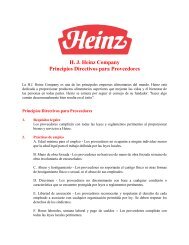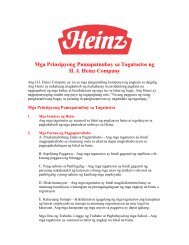ANYTIMEkANYPLACEkANYWHERE - Heinz
ANYTIMEkANYPLACEkANYWHERE - Heinz
ANYTIMEkANYPLACEkANYWHERE - Heinz
You also want an ePaper? Increase the reach of your titles
YUMPU automatically turns print PDFs into web optimized ePapers that Google loves.
the company’s workforce was reduced by approximately 200 employees, principally through<br />
the closure of Ore-Ida’s Boise head office and through the divestiture of the Clarksville,<br />
Arkansas sweet potato business.<br />
Pretax savings totaled approximately $70 million ($10 million non-cash) in Fiscal 2000<br />
resulting principally from the plant closures, administrative reductions and factory downsizings.<br />
Capital expenditures related to the restructuring totaled $173.6 million in Fiscal 2000 and<br />
$5.8 million in Fiscal 1999 and related principally to new equipment resulting from creating<br />
manufacturing centers of excellence.<br />
The company expects to incur approximately $150 million of additional implementation<br />
costs in Fiscal 2001. Implementation costs consist of incremental costs directly related to the<br />
implementation of Operation Excel, including consulting fees, employee relocation costs,<br />
unaccruable severance costs associated with terminated employees, training costs, equipment<br />
relocation costs and commissioning costs.<br />
PROJECT MILLENNIA<br />
During the fourth quarter of Fiscal 1997, the company announced a reorganization and<br />
restructuring program named ‘‘Project Millennia,’’ which resulted in a total cost of approximately<br />
$750 million over three years. The reorganization plan was designed to strengthen the<br />
company’s core businesses and improve profitability and global growth. Key initiatives were<br />
focused on process changes and product line rationalizations.<br />
The company has completed Project Millennia. During Fiscal 2000, the company utilized<br />
$19.6 million of severance and exit accruals. The utilization of the accruals related principally to<br />
the closure of a tuna processing facility in Australia, the closure of a tomato processing facility<br />
in Spain and costs associated with contractual lease commitments of the U.S. Weight Watchers<br />
classroom business, which were transferred to the buyer of the classroom business.<br />
As of May 3, 2000, the company has closed or divested all of the 25 plants that were<br />
scheduled for closure or divestiture. Project Millennia has resulted in a net workforce reduction<br />
of 2,250 employees.<br />
The financial goals of the project have been achieved as follows:<br />
Pretax savings in excess of $200 million, of which $10 million were non-cash savings, were<br />
realized in Fiscal 2000<br />
Gross profit margins, excluding restructuring related items, increased to 40.3% in Fiscal 1999<br />
Operating working capital was reduced by approximately $350 million in the first year of<br />
the program<br />
More than $1.3 billion of free cash flow was generated in the first year of the program.<br />
As of May 3, 2000, there are $0.5 million of remaining Project Millennia accruals. These<br />
accruals relate to contractual lease commitments in the U.S.<br />
RESULTS OF OPERATIONS<br />
2000 versus 1999: Sales for Fiscal 2000 increased $108.3 million, or 1.2%, to $9.41 billion from<br />
$9.30 billion in Fiscal 1999. Volume increased sales by $349.7 million, or 3.8%, and acquisitions<br />
increased sales by $438.2 million, or 4.7%. Divestitures reduced sales by $407.4 million, or<br />
4.4%, lower pricing reduced sales by $161.2 million, or 1.7%, and the unfavorable impact of<br />
foreign exchange translation rates reduced sales by $111.0 million, or 1.2%. Domestic operations<br />
contributed approximately 52% of consolidated sales in Fiscal 2000 and 53% in Fiscal 1999.<br />
(32)


